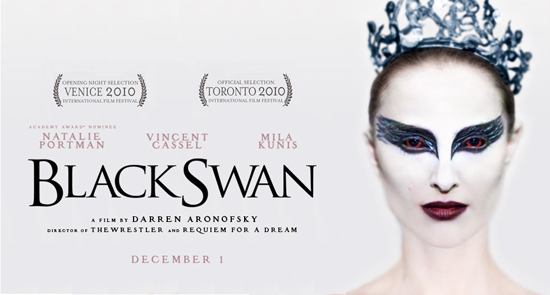On paper, this film sounds terrible. The trailer is one of the most off-putting trailers I’ve seen (though in hindsight it is a rather concise and accurate representation of the film) and I’ve been highly skeptical of director Darren Aronofsky. I admire Requiem for A Dream, but found myself bored and insulted by The Fountain, and disappointed with the dull filmmaking surrounding Mickey Rourke’s wonderful performance in The Wrestler. With that film, Aronofsky debuted a particular outlook on filmmaking: Trying to to something special with a generic story (his next film is an entry in the X-Men franchise). I was unimpressed by his efforts there, to the point of wondering where the driven man behind Pi and Requiem went.
He’s back in spades in Black Swan, successfully taking a familiar story and breathing exhilarating life into it. Of all the young filmmakers who emerged in the 90’s with strong, idiosyncraticc voices (PT Anderson, Wes Anderson, David Fincher, David O. Russell and Spike Jonze being the cream of the formidable crop), Aronofosky has shown himself to be the least intellectual, telling direct, emotional stories with brute force. The overriding theme of Black Swan is that of artistic perfection. It is in essentially the same story as The Wrestler, but Aronofosky has done away with love interests and children. Its main character must give in to her dark side in order to achieve it, to the exclusion of all else. I don’t personally buy this romantic notion of the tortured artist- yet Aronofsky has presents it so barely, so disarmingly and so passionately, that I gave in lock, stock and barrel.
It isn’t going to be easy explaining how an insane, cliched, absurd, often laugh-out loud ridiculous movie with a flimsy plot and several half-baked ideas made by a team of people whose work I don’t usually enjoy is currently my favorite film from 2010.
It does have a fine cast that does good work, for one.
To call this Natalie Portman’s best adult performance is somewhat lacking. I’ve always had a hard time pegging Portman’s work- she can be wonderful yet seem totally disconnected from her surroundings in a film. She seems to be trying hard, but almost always seems in some essential way miscast. She usually appears to be cast as an idea ,because of associations filmmakers and audiences have of her as the girl from Leon and Heat and Star Wars Episode 1. There has always been something essentially childish about her roles. Black Swan is the first film that really acknowledges that (and not in a condescending way like Closer). Aronofsky has freed her from being film audiences’ little sister, in giving her a role that shows her struggle with that screen persona.
Portman’s Nina is Mommy’s little girl, whose dream as an adult is her childhood dream of being a perfect dancer. Barbara Hershey is hardly shy about channeling Piper Laurie as the domineering stage-mom who is living through her child, but as monstrous as her methods can be, Nina shares her mother’s aspirations for her of becoming a great dancer, and Hershey does get to show some motherly love a couple of times in the film.
Their hopes and dreams appear to be realized when ballet director Thomas )pronounced without the ‘s’ and played by Vincent Cassell as a professional sex-appeal oozer) chooses Nina to be the Swan Queen in the new production of Swan Lake. Thomas, however, wants Nina to play both the main roles: the pure and innocent White Swan as well as the passionate and dangerous Black Swan. Nina can easily ace the innocence. It’s the passion that’s the key to her transcendence as a dancer, and both Aronofsky’s previous work (Mickey Rourke going back in the ring though it means sure death) and the casting of Portman can leave no doubt: The Black Swan must emerge, even if it kills the White Swan. And no one can accuse Aronofsky of being shy or hesitant in how he goes about this- in most ways, this is not a nice and waifish dance movie, but a full-on psychological horror movie, and it means business (the first scene is literally a nightmare).
The lightening rod of Nina’s angst is Lily, played by Mila Kunis. She’s the sexy new girl, who eats, drinks, smokes and pops what she likes, encourages mens advances, comes late, interrupts rehearsals and giggles lasciviously. She’s The Black Swan personified; unfortunately, Aronofsky doesn’t quite know what to do with her all the time, and her character did feel a bit too thin even in Insane Mom/Dangerous and Sexy Frenchman land. Though Kunis may seem fully-formed when compared to Winona Ryder, who really has nothing to play but pathetic shrew. As the aging star (somewhere between 35 and death is, unfortunately, as specific it needs to get in the dance world) who is replaced by Portman, Ryder is far too jarring. The intended irony of casting the actress who would have starred in Black Swan 10 years ago as a washed-up has-been wasn’t enough for me (especially since saying the situation is sad hardly absolves Aronofsky from being part of the same trend).
Throughout the film, Nina is plagued by gnashes and cuts and bruises, both real imagined, and has Cronenbergian visions of her own decay. The dichotomy of the two Swans is manifested at every turn- every character is an antagonist to Nina and supports her, and Nina herself can seem variably paranoid or a victim. This is emphasized -none to subtly- by the constant presence of reflections. In practically every room in the film, there is a mirror, almost always cracked or fractured in some way. This blunt device can seem either a silly grasp at psychological mumbo-jumbo or a constant bit of inexplicable profundity. My experience with this crazy movie shows that it is mostly both at the same time, though along with the rest of the film, it becomes less and less silly over time.
So, a reasonably accurate way to describe Black Swan would be The Red Shoes, All About Eve and Black Narcissus meet Repulsion, The Tenant and Carrie, only without the visual richness of Powell, Polanski or DePalma. The film does have an indelible look though- the same kind of hand-held, close-up heavy and grainy look that are typical of Aronofsky’s earlier films. Matthew Libatique’s cinematography generally makes the images look like a low budget independent film from decades past, a naturalistic slice of drama. But Aronofsky’s propensity for tight close-ups -there are practically no establishing shots and very few wide shots in general- make the mood extremely claustrophobic and melodramatic, effectively putting us in a similar head-space as Nina.
One has to be very confident to make a psychological horror dance film, doubly so to shoot it in such a gritty fashion; but it takes real artistic vision to achieve the ravishing operatic scope that his film aims for. Aronofsky is so confident that he doesn’t even care to ease people into the film- this is a very, very, easy film to mock. So many trite horror tropes are crassly employed, the supporting characters are walking cliches…it almost invites you to laugh at it. Aside from the fascination of watching Nina/Portman working towards confronting and eviscerating her former self, the main thing that kept me optimistic for this film in its less than auspicious first act is the music.
Clint Mansell, who scored all of Aronofsky’s films, had the task of adapting Tchaikovsky’s Swan Lake score to this film. He adds his own electronic elements and inevitable pyrotechnics for some of the horror moments and more extreme scenes, but this score is dominated Tchaikovsky. And in an age where so many of the most lauded scores are closer to sound effects and minimalistic, it was a delight to hear such a maximalist, melodic and utterly musical score to a film (it saddens me that the most invigorating score this year is curtousy of Tchaikovsky, and that only in an insane melodrama does it seem to be acceptible). After the depressing, detached, textural and unobtrusive electronic score in The Social Network -which enforces the film’s cynicism, simplicity, lack of insight, being bleak if not outright nihilistic-, the music in Black Swan seemed not only aurally welcome, but positively a declaration of intent: It is rich, romantic, passionate and utterly sincere, just like the film reveals itself to be.
After a hum-drum year at the movies, one where I found few films worth getting excited about, Black Swan’s rudeness, bluntness, and utter insanity shook me out of the increasingly desperate search for a film that was alive, that had a real pulse, that didn’t feel embalmed and encumbered by the weight of issues or depressions or acclaim or relevance or squareness or costs. Even as I write this, I am aware of the heresy of that undisciplined sentence- but it is not vacuousness or irrelevance or lack of thought that I come to praise. It is the feeling I got as I was walking of Black Swan that this film, as a whole, was willed into being by an artist, an artist who cares about everything in the film. Aronofsky may not be the deepest thinker, but this movie feels nurtured and discovered and loved and utterly sincere. Any problems with the plot are solved by the sheer relentlessness and devotion by its creators, who are anxiously striving for elation, for ecstasy, for something transcendent that can’t be put into words. The plot alleges that it is about perfection in art, but that is the wrong word for this film. In its finale, this film recalls the hysterical intensity of a classic DePalma ending, but with rapturous beauty in place of jagged cynicism. Black Swan is far from perfect -even calling it great seems to be inaccurate to me- yet is some sort of masterpiece, a work of art that I found to be shocking and utterly wondrous.
SHLOMO PORATH







Comments are closed.